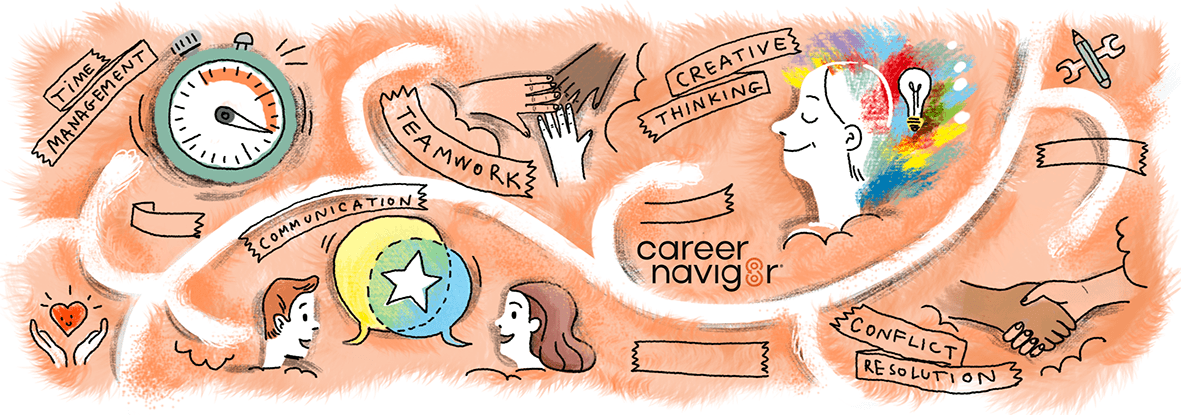How to do a Soft Skills Evaluation

Soft skills are the glue between you and your work. But for many of us, they’re an area often ignored. You can be a great accountant, but if you fail to convey your message to your clients, they won’t rely on your word and trust you with their money.
One of the best ways to go about working on evergreen and ever-important soft skills is to evaluate them. Because you can’t improve what you can’t measure. But how can you evaluate soft skills? How can you improve them? And is there someone who can help you with all of this? Read on to find out.
What are Soft Skills?

Soft skills are interpersonal qualities that help you navigate your personal and professional life.
Imagine you’re playing Lego with your friends – yes, grown-ups do that. 😀 You put the pieces together and build anything you want, like the Hogwarts castle from Harry Potter. You need the ability to assemble the pieces together and follow the instructions to the T. These are your ‘hard skills’ – the teachable and specific skills you can learn and practice.
On the other hand, having patience, paying attention to detail, thinking out of the box using your creativity, and talking with your friends while you build together are your ‘soft skills’. They aren’t taught through a credit course at a school or uni – you learn them over time through self-analysis, taking measured steps, and getting feedback from a trusted source.
With strong interpersonal skills, you can survive and succeed in the real world because you know how to talk and work with others. How to make the most of your efforts and lead teams.
Here are the top 5 soft skills that you can focus on:
Communication
From the moment you wake up to the moment you lie down, you communicate with people. At work, this translates into written, verbal and non-verbal communication. According to Grammarly and The Harris Poll, 69% of workers feel stressed from confused messaging and unclear instructions. Effective communicators exhibit reliability, professionalism and persuasiveness. So don’t underestimate knowing how to express yourself and adapting to your colleagues’ communication styles.
Time Management
All of us get 24 hours each day, and with our work, family, and personal responsibilities, it’s natural to feel overwhelmed. For example, if you’re a marketer, you have to create social media reports, analyse web traffic, and deal with last-minute campaign changes. Time management helps you prioritise and work on tasks and improve your performance at work.
Emotional Intelligence
Michael Jackson had it right in Man in the Mirror (if you haven’t listened to it, this is your cue): ‘If you wanna make the world a better place, take a look at yourself and then make a change’. Being empathetic to others’ emotions is crucial because it helps you connect with people and build relationships. Being emotionally intelligent equips you with skills to support your colleagues and keep calm under pressure.
Creativity
Creativity fosters innovation and helps you approach tasks with a different perspective. Goodbye cookie-cutter approach to solving problems, hello improved performance and tailored solutions. 👋 Creativity is one of the most sought-after soft skills because it boosts productivity and helps you adapt to changes.
Leadership
Influential leaders communicate in a way that engages others to take action. They’re approachable and amiable and customise their communication style based on the person they’re talking with. Who said you had to lead a team of 50 to be a leader? Start small – lead by example. To improve your leadership qualities, you can start mentoring your peers or give reverse mentoring a shot.
Why is Soft Skills Evaluation Important?
What’s the reason to test yourself at the end of each lesson? To learn about your strong areas and those that you can improve.
Soft skills are vital in advancing your career and collaborating with others. Evaluating them helps you know what your strengths and weaknesses are in order to progress on your journey.
For example, you can be good at coding but need help communicating with your team. If you’re unable to tell them why you made that iteration in the loop, your team may not understand it.
Evaluating your soft skills enables you to focus your efforts and improve yourself. You enhance your employability and become better equipped to handle challenges in your professional and personal life.
How to Evaluate Soft Skills
3 steps: reflect and set goals, get feedback, and work on the next steps. Here’s how:
Reflect and Set Goals
Self-reflection is one of the best ways to find areas in your soft skills that could use polishing. Start evaluating by reflecting on your personal and professional experiences. Think back to a point when your soft skills were put to the test. How did you perform when you didn’t feel confident in your abilities?
You can also do a SWOT analysis (that’s Strengths, Weaknesses, Opportunities, and Threats) to explore opportunities for success. Use this PDF by Forbes to download a template for SWOT analysis.
Defining The Next Steps
Once you understand where you need to improve, it’s time to set goals and identify the steps that’ll get you there.
When you’re working on your communication skills, giving a speech at the Oscars next week sounds daunting (bathroom practice doesn’t count). But talking with three colleagues this week is easier. Joining a group and delivering two speeches there is easier. You’re still stepping out of your comfort zone but taking it one step at a time.
The key to setting goals is making them SMART – Specific, Measurable, Achievable, Relevant and Time-bound. SMART goals help you turn ideas into tangible, measurable actions. They’re meaningful and tailored to your unique self. When you’re working with a soft skills mentor, specify the time by which you will meet each objective. It gives you a clear timeframe for action and acts as a constant reminder to make the process disciplined and actionable.
Feedback
Feedback helps you correct your course and refine your plans. For example, if you’ve been working on your public speaking skills, record yourself doing a presentation and see how far you’ve come. Check your body language – are you slouching? Do you have a welcoming stance? Are you letting the nervous jitters take control? Check out these tips and tricks to improve your body language and confidence.
But if you want feedback from a trusted source, work with a mentor (we call them Navig8rs). A trusted soft skills mentor evaluates and holds you accountable for your progress. So if you’re struggling with time management, your mentor can tailor strategies to help you set priorities and SMART goals.
A tip: Ask your mentor for 360-degree feedback and be honest when you share your progress with them. They’ve been where you are and understand your situation – it’s wise to share your problems and progress with them clearly. 🙂
Where Can You Find a Soft Skills Mentor?
On Career Navig8r, easy. Career Navig8r is a unique platform that connects you with mentors in a variety of roles and industries. They’re experienced and provide constructive feedback to improve your soft skills. To get started, sign up with Career Navig8r today and explore potential mentors on the platform. Soft skills are essential for your career, and we believe you’ll do well.


